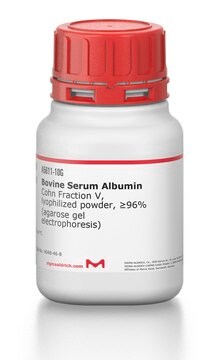A8531
Bovine Serum Albumin
pH <5.0, powder
Synonym(s):
Albumin bovine serum, BSA, Bovine albumin
About This Item
Recommended Products
biological source
bovine
Quality Level
form
powder
mol wt
~66 kDa
~66,000
packaging
vial of 50 mg
origin
USA origin
technique(s)
ELISA: suitable
gel permeation chromatography (GPC): suitable
immunohistochemistry: suitable
impurities
~0.3% dithiothreitol
pH
<5.0
suitability
suitable for (Suitable for use as a gel filtration marker)
Looking for similar products? Visit Product Comparison Guide
General description
Application
- for blocking of nonspecific immunoglobulin during immunohistochemical reactions.[2]
- to coat microplates for blocking non-specific binding during I-ELISA (Indirect Enzyme-linked Immunosorbent Assay)[3]
- as molecular mass standard in analytical gel filtration chromatography for Superdex® 75 10/300 GL gel filtration column.[4]
- for measuring fluorescence for PR1 (phytofluor red 1) by using Fluorescence correlation spectroscopy (FCS)[5]
- as a reference mixture along with horse Mb in Size Exclusion Chromatography[6]
Biochem/physiol Actions
Preparation Note
Legal Information
Storage Class Code
11 - Combustible Solids
WGK
WGK 3
Flash Point(F)
Not applicable
Flash Point(C)
Not applicable
Personal Protective Equipment
Certificates of Analysis (COA)
Search for Certificates of Analysis (COA) by entering the products Lot/Batch Number. Lot and Batch Numbers can be found on a product’s label following the words ‘Lot’ or ‘Batch’.
Need A Sample COA?
This is a sample Certificate of Analysis (COA) and may not represent a recently manufactured lot of this specific product.
Already Own This Product?
Find documentation for the products that you have recently purchased in the Document Library.
Customers Also Viewed
Protocols
Gel filtration chromatography is an established method for determining the size and molecular mass of proteins.
Our team of scientists has experience in all areas of research including Life Science, Material Science, Chemical Synthesis, Chromatography, Analytical and many others.
Contact Technical Service
